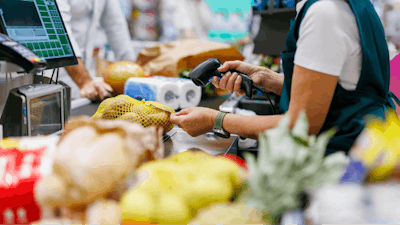
BALTIMORE – As global food prices rise and reducing food waste remains a top priority, a groundbreaking new study in the INFORMS journal Management Science reveals how blockchain technology could revolutionize the grocery industry. By increasing transparency in food freshness, blockchain adoption could help retailers slash waste, maximize profits and reshape relationships with suppliers.
The study, “The Blockchain Newsvendor: Value of Freshness Transparency and Smart Contracts,” examines how grocery retailers can use blockchain-powered data to make smarter inventory decisions that reduce spoilage while improving their bottom line. However, while retailers stand to gain, suppliers may see declining profits unless smart contracts are introduced to adjust compensation based on freshness data.
How Blockchain Reshapes Food Supply Chains
Using real-world data and advanced modeling, the study found that blockchain-enabled freshness tracking is most valuable for perishable goods with stable demand, such as berries, lettuce, fish and beef. By better matching supply with demand, retailers can minimize food waste and increase efficiency.
However, such increased transparency could hurt suppliers if grocers order less to avoid spoilage. To create a win-win scenario for both grocers and suppliers, smart contracts can ensure fair pricing and compensation based on freshness data, maintaining a healthy supply chain.
“As inflation puts pressure on grocery prices and food waste remains a global crisis, blockchain technology offers a game-changing solution,” says N. Bora Keskin, one of the study’s authors and a professor at Duke University. “By providing real-time transparency on freshness, retailers can make smarter purchasing decisions – but suppliers may need new incentives to stay on board.”
“The use of smart contracts ensures fairness across the supply chain,” explains Chenghuai Li, study co-author, also from Duke University. “Retailers get the freshest products, suppliers get compensated fairly, and ultimately, consumers benefit from better quality and lower waste.”
Why This Matters: A Timely Solution for Rising Food Prices and Waste
The United Nations estimates that one-third of all food produced globally is wasted – a staggering problem that blockchain could help mitigate. Meanwhile, retailers are increasingly looking for tech-driven solutions to streamline supply chains, reduce waste and meet growing consumer demand for transparency.
“This isn’t just about technology – it’s about changing the way we handle food,” says Jing-Sheng Song, co-author and professor at Duke. “Blockchain-powered transparency can make fresh produce supply chains more efficient, more sustainable and more profitable for everyone involved.”
As grocery chains and policymakers explore ways to combat food waste and enhance supply chain efficiency, this research offers a compelling blueprint for leveraging blockchain technology in a way that benefits both businesses and consumers.






















